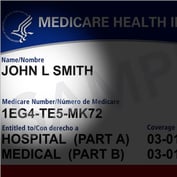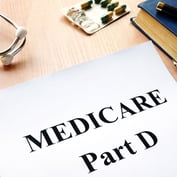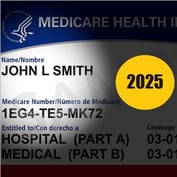An agent asks, “What outpatient drugs are covered by Medicare Part B?”
While most outpatient prescription drugs are now covered by the Medicare Part D drug plan, Medicare Part B will continue to pay for the few outpatient drugs it has always covered. Some of the drugs that Medicare Part B covers include:
- Some antigens (often used to stimulate the production of antibodies)
- Erythropoietin (used with end-stage renal disease)
- Hemophilia clotting factors
- Immunosuppressive drugs for transplant patients
- Injectable drugs administered by doctors’ offices
- Oral cancer drugs
- Oral anti-nausea drugs
- Injectable osteoporosis drugs
- Some drugs used in infusion pumps and nebulizers
- Insulin used in insulin pumps for diabetics
There are no lifetime limits or caps on Medicare coverage.
These coverage rules apply for outpatient drugs that are administered to patients in the doctor’s office:
- The doctor must buy the drugs and administer them directly to the patient.
- The doctor must accept Medicare assignment for the cost of the drugs.
And, these rules apply for outpatient drugs that patients administer themselves:
- The patient must purchase from a pharmacy that accepts Medicare assignment for the cost of the drug.
- The patient must use a pharmacy that knows how to file for the Part B drugs. They can ask their hospital or doctor’s office for a referral, or visit www.medicare.gov or call 800-Medicare to find one.
Remember: Part B drugs can be very expensive – for some, up to $4,000 a month. Medicare pays 80 percent, and the co-insurance is 20 percent, but if the patient has a Medicare supplement plan, or Medigap, it will pick up the 20 percent so that the patient won’t have an out-of-pocket. If your client has a Medicare Advantage plan, they will have co-insurance of up to 30 percent in some cases, so if they are on a lot of Part D drugs, they may want to get on a Medicare supplement instead of a Medicare Advantage Plan.
If your client is unable to get a supplement or Advantage plan, there are several charity and government programs for which they could qualify, including Needy Meds and Free Medicine Program. Qualification requirements for these programs vary based on income and needs.
Again, knowing about the needs of your individual client and being educated on Part D drugs will allow you to become the respected consultant that your client needs when a chronic illness occurs. There is always a way that you can help your clients, if you know what to do and how to do it.
Source: Mike L. Alexander Sr., Medicare consultant for Senior Benefit Services, a division of ABM Insurance & Benefit Services Inc.
If you would like to be considered for our Medicare FAQ expert panel to answer frequently asked questions, email editor Christina Pellett.
Do you have a Medicare question that you would like answered? Email us and let us know! Please put “Medicare FAQ” in the subject line.








 March 08, 2011 at 07:00 PM
March 08, 2011 at 07:00 PM










